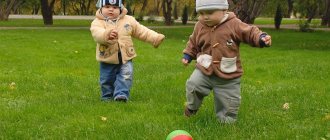Children's egocentrism is part of a child's development. It lies in the fact that the child, seeing constant care and attention from others, begins to take it for granted, and reacts painfully to any changes in relation to his own person.
Egocentrism as a characteristic of an individual is an integral part of a child’s development.
First, most children have egocentric speech because they often talk to themselves. The concept of children's egocentrism occupies a central place in the disclosure of inner speech and the entire inner world of the child. Sometimes children exhibit aggressive behavior.
Behavioral characteristics
Egocentric speech is the preliminary stage that leads to actual socialized speech, such as that used by adults. Children have difficulty managing their own thought processes; they cannot handle symbolic and abstract operations the way adults do. Egocentric speech resembles a monologue addressed to no one. Everyone uses this language as a child to accompany their actions. This makes it an assistive mechanism for the child's daily activities. According to scientific research, the amount of egocentric speech in preschool age is extremely high. Approximately half of the speech patterns of 6-7 year old children ego src=»https://margoritka.ru/wp-content/uploads/2019/10/child-self-regulation.jpg» class=»aligncenter» width=»550″ height=”287″[/img]
Thus, egocentrism and its behavioral characteristics predominate in childhood.
Needless to say, adults can be self-centered too. Egocentrism in adulthood is a personality trait and part of the character structure. The social environment surrounding a self-centered person is not of particular interest to him. The only concerns of these adults are their internal and external feelings, desires and actions. It is clear that people's first priority may be themselves.
Egocentrism is considered normal when it does not border on pathology. Pathological egocentrism contains features of selfishness and can serve as a negative factor in a person’s social interactions. Extreme selfishness may be a symptom of mental illness.
From my own childhood memories:
I remember the line at the store and I was crying and begging my mom to buy me “that delicious pink bubble gum.” I also remember my mother patiently explaining to me that the purpose of our visit was not gum, but other products necessary for our existence. We didn't have enough money for food, which was beyond my childish and selfish understanding. My mom finally gave in and bought me some gum, which I immediately threw back on the customer service desk, screaming, “I want another one!” This one is thin, but I need a thick one! - By saying this, I meant that I need the whole box, and not just one.
I now look back on this incident with a distinct sense of shame. When this situation happened, I didn't feel any stings at all. I consider this childish egocentrism and, perhaps, lack of upbringing.
Scientists have proven that excessive egocentrism is harmful to interpersonal relationships in adulthood. As mentioned above, children's egocentrism is a scientifically based phenomenon that is considered normal and necessary for the development process.
From the point of view of adults, egocentrism is a position in which a person consciously puts himself. It is characterized by a focus on one's feelings, experiences and interests, and an inability to receive and consider information that contradicts these experiences. This is especially important when conflicting information comes from someone else. In psychology, egocentrism is described in terms of various aspects of mental activity. This is cognitive egocentrism, which characterizes primarily the processes of perception and thinking, moral egocentrism, the meaning of which lies in the inability to understand the moral foundations of other people’s behavior, communicative egocentrism, for example. Generally speaking, egocentrism is associated with cognitive processes.
Communicating with an egocentric child is not an easy task, because he is used to having the only correct opinion - his own. And this is largely a consequence of mistakes in education. Remember the well-known Marfushenka-Darling from the fairy tale “Morozko”, the mother constantly spoils the already grown girl, protects her from any household worries, is touched by any trick of her daughter, she is allowed to offend her sister with impunity, the father has no weight in the family, and is not able to eccentric girl. As a result, Marfushenka is “king and god,” and everyone else is directly subordinate to her.
This is the surest way to raise an egocentric child. There is a very memorable phrase in the fairy tale “The Snow Queen” - “Pamper your children, and then they will grow up to be real robbers.”
Now we know how the character of egocentrics is formed. We realized our mistakes, drew conclusions, but now how can we correct the situation so that egocentrism does not enter the “chronic” stage. Restoring the authority of parents is not easy, but you can start by learning to say a firm “no” to the next whim, remembering your own hobbies, so that parental attention and care are not intrusive, do not allow your child to offend other people, instill in him respect for others , the ability to share with peers, do not rush to the child if he has fallen lightly, you also need to feel sorry in moderation. By gradually changing your attitude towards your baby, you will notice more independence and other positive changes in him. Don't rush, you will achieve results over time.
Parenting styles
Authoritative style
Parents are an authority for the child - they take an example from them. Democracy reigns in such families - when deciding important issues, the opinions of all its members are taken into account. Parents set rules for the child, taking into account the needs and interests, always accept the feelings and emotions of their child, and are ready to provide him with autonomy in resolving those issues that he is already capable of.
One of the main features of such a family is flexibility: parents change the system of rules and norms depending on the age of the child. The level of control on the part of adults is high, there is no physical or verbal aggression.
A child raised in a family that uses an authoritative parenting style will be distinguished by high self-esteem, determination, willpower, and responsibility. Such children are confident in themselves and their abilities, they know what they are striving for, and are most often friendly. They are ready to comply with social norms, have a high level of self-control and self-regulation, and accordingly, the risk of deviant behavior in such families is quite low.
Authoritarian style
It implies strict methods of education: “As I said, so it will be” - parents set the rules and are not ready to change them, the child in the family does not have the right to vote and is forced to obey. Parents strictly control the child, do not accept, and sometimes even reject his feelings and experiences. They love the child and strive to give him the best - everything except affection and understanding.
As a result of such upbringing, the baby will grow up passive, will always focus on authoritative individuals and will not be able to take initiative. In families that use an authoritarian parenting style, any manifestations of leadership are suppressed. Such children are at risk for developing addictive behavior.
Liberal style
This parenting style is close to anarchy. A child can do anything - he grows up in an atmosphere of complete permissiveness. Parents treat their child warmly and accept his emotions, completely trust the child, freeing themselves from responsibility for the result. The level of control is low - parents are not able to demand and organize, without actually helping and supporting the child.
Children grow up anxious and nervous because they do not have clear rules and norms - they do not know what is right. Prone to disobedience, aggressiveness, impulsiveness. Problems in kindergarten and school often arise due to the need to follow rules.
These children are highly likely to fall under the influence of antisocial groups.
Indifferent style
This is the most unfavorable parenting style, in which there is no acceptance of the child’s feelings and emotions, and no control. Parents are emotionally cold towards the child, do not notice his interests and do not engage with him, while they are very picky - they demand that order be maintained and that demands be obeyed.
Children from these families are most susceptible to developing deviant behavior, including committing crimes. It is difficult to predict exactly how a child in such a family will grow up - he can be very aggressive and impulsive, or maybe anxious and unsure of himself.
It is worth understanding that the formation of a child’s personality is influenced by many factors, and even in families with an unfavorable environment a fairly harmonious personality can grow, but, nevertheless, research shows that the parenting style has a significant impact on the child’s development.
Children's egoism and egocentrism
Children's egoism should not be confused with egocentrism. Egocentrics consider themselves the center of the universe, and egoists put their interests above others.
What to do with children's egoism? Sometimes it is enough to let the child go among his peers, to a kindergarten or on the street, and there you need to be able to make friends, share and give in, but if the child stubbornly shows selfish qualities, it is better to consult with a child psychologist, he will outline gradual steps to get rid of this “illness.”
An egocentric child is not always a death sentence, but more often the next stage of development. The main thing for parents is that their child overcomes it safely.
But sometimes children’s egocentrism goes beyond the proper boundaries and becomes a character trait that will be smoothed out only by the time the baby grows up and begins to look at the state of things reasonably. As children age, their ability to take a social perspective increases, and their assumptions about similarities with others (egocentric projection) and their intergroup bias should decrease. This is the hypothesis of children's egocentrism, unless mental development is delayed. Some people carry this trait throughout their entire lives. People around him, as a rule, begin to accept such a person with all his shortcomings, getting used to it or ignoring him.
Overprotection
The overprotective type of parenting is characterized by the position of adults “the child is small, so you have to do everything instead of him.” This attitude towards a child often occurs in families where the baby has been expected for too long or the pregnancy has been difficult. Parents have invested so much in waiting that they cannot afford for anything to happen to their child. Therefore, they indulge all the child’s whims and blow away specks of dust from him.
- Infantility and capriciousness, when the child is used to everything being decided and presented for him;
- Irresponsibility: decisions are made by adults, which means they are responsible;
- Inability to take care of yourself: cleaning, washing, ironing;
- Inability to compassion: the child is accustomed to taking into account only his interests, and not others;
- Inability to accept alternatives and hear refusal.
It is difficult for a person overprotected by his parents to live independently, build relationships and make career breakthroughs, since he lacks coping skills, determination, and self-confidence.
- First of all, understand that a child is a person who will sooner or later be left without you. The task of adults is to make every effort to teach him to cope with his life on his own.
- Distribute responsibilities: each family member must do something around the house, including your child. This creates responsibility and removes the question of the child’s exclusive position in the family.
- Let's give them the opportunity to do things on their own that are age-appropriate: make the bed, collect toys, do homework, or go to the store. It is independent actions that build self-confidence and the desire to do more;
- Don't control every step. The child himself must learn to draw up action algorithms and be responsible for them.
Get busy with your life. Overprotection occurs due to the absence of an adult’s own life. Show interest in something other than your child. This way you will give him more freedom and fill yourself with something exciting. This way you will teach him to love himself.
Excessive guardianship is a sign of an adult’s lack of self-love. We unconsciously do for others what we lack. Think about it and start taking care of yourself: make yourself happy, engage in hobbies, go on vacation, go on a diet, go to the movies. This will allow parents to live an interesting life and not turn their child into an infantile with whom no one wants to communicate.
The concept and theory of children's egocentrism
Psychological characteristics of a primary school student Read more: Examination program for elementary school students (intellectual development)
1.4 Concept and theory of children's egocentrism
When examining the psychological characteristics of gifted children, it seems important to study the severity of their egocentric position comparatively with the norm. This problem is relevant due to the frequent alienation of such children from the rest of the world.
An extremely gifted child develops a stable positive self-esteem, high and even inflated. He chooses quite carefully among his peers with whom to be friends and communicate. Because of this, he does not always develop sufficient communication skills with peers, which results in isolation and isolation from people.
The starting point of the study was Jean Piaget’s ideas about egocentrism and their analysis in modern studies by foreign and domestic authors.
The nature and age-related dynamics of the phenomenon of egocentrism is understood in many ways in different psychological directions - cognitive psychology, psychoanalysis, activity theory, etc.
In scientific psychology of the twentieth century. the problem of egocentrism was posed by J. Piaget. J. Piaget described egocentrism as a mental position that a child takes in the process of learning about himself and the world around him over a number of stages of intellectual development. J. Piaget focused on the intellectual development of the child, leaving without experimental analysis the specifics of the development of the affective sphere of personality. The followers of J. Piaget believed that it is advisable to consider the phenomenon of egocentrism not only in connection with the development of the cognitive sphere, but also in connection with the affective experience of the individual (H. Hoffman, R. Selman, G. Dupont). In studies of the phenomenon of egocentrism (understood in the tradition of J. Piaget), it is noted that it manifests itself both in the intellectual and in the motivational-need sphere of the individual. Ideas about the phenomena of egocentrism in the personal-affective sphere, in turn, are also not consistent with each other. A number of studies indicate that there are genetic relationships between egocentrism in the cognitive and personal-affective spheres, but the theoretically hypothesized relationships are not found in empirical studies (D. Elkind, R. Enright et.al., etc.).
The term "egocentrism" has caused a number of misunderstandings. Piaget acknowledged the poor choice of word, but since the term had already become widespread, he tried to clarify its meaning. Egocentrism, according to Piaget, is a factor of cognition. This is a certain set of pre-critical and, therefore, pre-objective positions in the knowledge of things, other people and oneself. Egocentrism is a type of systematic and unconscious illusion of knowledge, a form of initial concentration of the mind when there is no intellectual relativity and reciprocity. Therefore, Piaget later considered the term “centration” to be a more successful term (Obukhova, 1981).
J. Piaget described three forms of egocentrism in accordance with the three main periods of intelligence development (Obukhova, 1981). This is egocentrism during the formation of sensorimotor intelligence (from 0 to 2 years), egocentrism at the stage of pre-operational thinking (from 2 to 7 years) and egocentrism during the formation of conceptual thinking (from 11 to 15 years). The ability to form inferences, acquired at the age of 12-15, following the rules of combinatorics and formal logic, allows the child to put forward hypotheses, draw conclusions from them and experimentally test their truth. At the same time, the child can build idealized ideas that are not always verifiable and often contradict real facts. J. Piaget called the adolescent form of cognitive egocentrism “naive idealism” of a teenager striving to reorganize the world, attributing unlimited power to his thinking. Intellectual decentration leads to the fact that the teenager begins to take into account external circumstances, becoming a real and active figure. In adults, it is also possible for the subject to center himself on himself in the process of cognition. According to J. Piaget, egocentrism tends to intensify whenever, in the course of development, we come into contact with something new, a previously unfamiliar sphere of cognitive activity. The “explosion” of egocentrism gradually fades as a person becomes accustomed to a new area.
It was precisely on the basis of this general goal that he first identified and investigated a particular problem - he studied the hidden mental tendencies that give qualitative originality to children's thinking, and outlined the mechanisms of their emergence and change. Using the clinical method, Piaget established new facts in the field of child development. The most important of them are the discovery of the egocentric nature of children's speech, the qualitative features of children's logic, and the child's ideas about the world that are unique in their content. However, Piaget's main achievement, which made him a world-famous scientist, was the discovery of the child's egocentrism. Egocentrism is the main feature of thinking, the hidden mental position of a child. The originality of children's logic, children's speech, children's ideas about the world is only a consequence of this egocentric mental position. Verbal egocentrism serves as an external expression of the child's deeper intellectual and social position. Piaget called this spontaneous mental position egocentrism (Obukhova, 1981). Initially, he characterized egocentrism as a state when a child views the whole world from his own point of view, which he is not aware of; it appears as absolute.
The child does not yet realize that things may look different than he imagines. Egocentrism means a lack of awareness of one's own subjectivity, a lack of an objective measure of things.
On the one hand, egocentrism means a lack of understanding of the relativity of knowledge of the world and coordination of points of view. On the other hand, it is the position of unconsciously attributing qualities of one's own self and one's own perspective to things and other people. The initial egocentrism of cognition is not a hypertrophy of awareness of the “I”. This, on the contrary, is a direct relationship to objects, where the subject, ignoring the “I,” cannot leave the “I” in order to find his place in the world of relationships, freed from subjective connections.
If in development there is a change of mental positions, their transformation, then what drives this process? Piaget believed that only the qualitative development of the child’s mind, that is, a progressively developing awareness of his “I,” can lead to this. In order to overcome egocentrism, two conditions are necessary: first, to realize your “I” as a subject and separate the subject from the object; the second is to coordinate your own point of view with others, and not consider it as the only possible one.
The development of knowledge about oneself arises in a child, according to Piaget, from social interaction (Obukhova, 1981). The change of mental positions is carried out under the influence of the developing social relationships of individuals. Piaget views society as it appears to a child, that is, as a sum of social relations, among which two extreme types can be distinguished: relations of coercion and relations of cooperation.
Coercive relationships impose a system of mandatory rules on the child. This type of relationship characterizes, according to Piaget, society, especially in the sphere of relations between the child and the adults around him. Coercive relationships do not promote a change in mental position. On the contrary, as a result of coercion, moral and intellectual “realism” arises, purely external ideas about the rules. When laws are imposed on a child by adults, judgments based on external impressions are inevitable. The real clash between the child's thinking and the adults around him is expressed in the child's systematic distortion of the information communicated to him by adults. When a child constructs a new concept using the language of adults, this concept remains entirely childish, since the child changes and assimilates it according to his mental structure. Social relations between adults and a child, especially if they are based on coercion, do not lead to the child’s awareness of his subjectivity. In order to realize your “I”, it is necessary to free yourself from compulsion, an interaction of opinions is necessary. This interaction is at first impossible between child and adult because the inequality is too great. The child tries to imitate an adult and at the same time protect himself from him, rather than exchange opinions. Only individuals who consider each other equal can exercise “developmental” mutual control. Such relationships appear from the moment cooperation is established among children.
When cooperating, there is a need to adapt to another person. The collision of one’s thoughts with someone else’s raises doubts and the need for proof. Through the establishment of cooperative relationships, there is an awareness of the existence of other points of view. As a result, rational elements in logic and ethics are formed. Piaget considered the establishment of these relationships to be an extremely important fact. In his opinion, social life creates the need for logical norms.
One of the most important concepts in Piaget’s system of psychological views is the concept of socialization (Obukhova, 1981). In his opinion, the term “social” has two different meanings. There are social relationships between a child and an adult. An adult is a source of educational influences for a child; he transmits to him the culture of society. The child perceives the adult as the source of specifically human feelings. With this understanding of the term, the child is social from the very beginning.
In addition to these relationships, there are social relationships between the children themselves (relations of cooperation) and between a child and an adult (relations of coercion), which Piaget calls socialization (Obukhova, 1981). Being a social being from the very beginning, the child is socialized only gradually. According to Piaget, the process of socialization does not regress, but, on the contrary, progresses. Social relationships of children from 2 to 7 years old represent a minimum of socialization. The child has not yet developed the tools of socialization, he is not aware of his “I”, and does not coordinate the points of view of other people with his own. The appropriate intellectual apparatus for this has not yet been formed.
Characterizing the characteristics of a child’s thinking at primary school age, L.S. Vygotsky noted that the child “is not yet sufficiently aware of his own mental operations and therefore cannot fully master them. He is still little capable of internal observation, of introspection. Only under the pressure of argument and objections does the child begin to try to justify his thought in the eyes of others and begins to observe his own thinking, i.e. to seek and discern by introspection the motives which lead him and the direction which he follows. Trying to confirm his thought in the eyes of others, he begins to confirm it for himself.” (Vygotsky L.S., 1984, vol. 4, p. 88)
Thus, separating intellectual and moral egocentrism allows us to better understand the nature of this phenomenon and study its age dynamics.
Chapter II Experimental study of moral egocentrism in primary schoolchildren
Psychological characteristics of a primary school student Read more: Examination program for elementary school students (intellectual development)
Information about the work “Features of egocentrism in gifted children of primary school age”
Section: Psychology Number of characters with spaces: 104927 Number of tables: 9 Number of images: 0
Similar works
Problems of giftedness in children of primary school age
90975
4
13
... see them. The texts of the fairy tales are attached (see Appendix No. 3); their ethical considerations and the names of the authors are not indicated. Conclusion The problems of gifted children of primary school age are revealed through their relationship with peers and adults. As it turned out, children have problems. The course work mentioned those that are most often reported by researchers. Currently …
Features of the development of self-esteem in stuttering children of primary school age
67621
0
0
..., teachers, parents. How his self-esteem will develop depends on this. Very often it can be overestimated or underestimated. Different self-esteem is also found in children of primary school age who stutter. 3. Stuttering Stuttering is a violation of the tempo-rhythmic organization of speech, caused by a convulsive state of the muscles of the speech apparatus. Stuttering, as one of the expressed speech...
Socio-psychological conditions for the development of achievement motivation in children of primary school age
114334
2
2
...successes; • students develop the belief that easy success does not bring true satisfaction, the need to set increasingly complex tasks for themselves. We divided the implementation of socio-psychological conditions for the development of achievement motivation in junior schoolchildren into two parts: the development of individual achievement motivation and the development of collective achievement motivation. For development …
Features of the development of thinking in children of senior preschool age with motor disorders
61133
2
14
... phenomena expressed in low intellectual performance, as well as inertia of mental activity. Chapter 2. Experimental study of the characteristics of the development of thinking in children of senior preschool age with motor disorders 2.1 Objectives, methods and organization of the study The practical part consisted of organizing and conducting an experimental study to identify ...
The most favorable method
The democratic type of education is considered the most favorable for the development of the future generation. Children get the opportunity to learn to be independent and at the same time disciplined and responsible. The child has his own responsibilities, but his interests are not infringed.
Adults respect the child’s point of view and take him into account when making important decisions. They are aware of the age-related characteristics of the baby and do not expect anything impossible from him. If necessary, parents justify their own requirements and are always ready to hear the child’s arguments. They do not take away his right to choose and at the same time impose a certain responsibility.
The child does not suffer from excessive guardianship; major conflicts do not occur in such families. Children listen to mom and dad, who explain to them what can and cannot be done.
The democratic style of upbringing in the family is characterized by such a feature as moderation. Kids do not show excessive aggression, but at the same time they have excellent prerequisites for becoming leaders. They are able to control others, but they themselves cannot be manipulated. This approach is also called the authoritative parenting style.
Typically, such children are morally stable, purposeful, open and sociable, they easily adapt to social life. However, it is worth mentioning those traits that are observed only in a small part of the offspring in the families described. This is altruism, sensitivity, empathy.
An authoritative style implies respect for the attitudes of the little person. It is important for parents to learn to be friends with the baby without losing their own authority in his eyes, so that the baby can trust them in the future.











